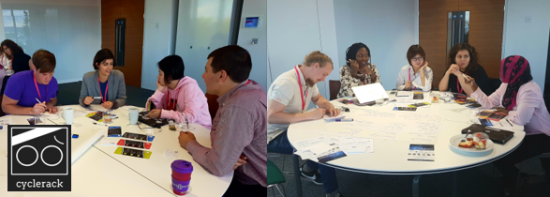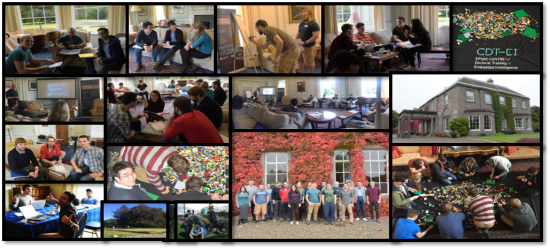Our final issue: Annual report 2022-2023
8 January 2024
Our last and final Annual Report is now published.
It covers the activities of the Centre in the academic years 2022 and 2023.
The report can be found in this link: http://tinyurl.com/yc8jcant
8 January 2024
Our last and final Annual Report is now published.
It covers the activities of the Centre in the academic years 2022 and 2023.
The report can be found in this link: http://tinyurl.com/yc8jcant
1 November 2023
Top 5 highlights and moments of the lifetime of this EPSRC CDT in Embedded Intelligence:
- The graduation of our students and researchers: link1, link2, link3
- The 2017 Summer School in London with 150+ PhD students of 8 CDTs of the Digital Economy Network: watch the video here.
- Our researchers travelling the UK and beyond presenting and showcasing their work: visit the 'news' section to see a few examples.
- The Induction Week at The Burn in Scotland and the LEGO® activities every year in 2014, 2015, 2016, 2017 and 2018.
- Our membership to the UKRAS Robotics & Autonomous Systems, and our 'Robots at the Movies' event in 2017.
1 February 2022
Welcome to the 2021 Annual Report from the EPSRC Centre for Doctoral Training in Embedded Intelligence. You can read here what our students and researchers have been working on this year, of great challenges due to the global pandemic. Despite that, there are great stories inside.
You can read the report about the Centre here.
This Annual Report gives an overview of all the activities for the EPSRC Centre for Doctoral Training in Embedded Intelligence for 2021. It includes information about our:
If you have any questions about what you read today, or would like to know more, do not hesitate to get in touch.
Marcus Pollard, Robin Hamer, Gajarajan Sivayogan and Wen Gu have developed a proposal that aims to save money and time by ensuring predictive maintenance of tablet-making machinery.
The UK subsidiary of global Connectivity and Networks component manufacturing specialist HARTING challenged the students to suggest potential applications for their new product MICA.
MICA (Modular Industry Computing Architecture) is an edge computing device that can be digitally retrofitted into existing production facilities as a direct interface to machines.
It provides a bridge between machines and cloud-computing and can be immediately and securely integrated into a production environment for minimal cost, providing continuous data processing and condition monitoring analysis of key operating processes.
The students decided to focus on a pharmaceutical application after being inspired by Marcus’ placement year at a British multinational consumer goods company.
They decided to focus on tablet presses as they are one of the most common pieces of equipment in a pharmaceutical manufacturing environment.
They work by filling a hole – known as a ‘die’ – with a powder and this powder is compressed by two metal punches to form a tablet.
Tablet presses used in manufacturing continuously use multiple dies and punches – collectively known as ‘toolings’ – to achieve high output.
Some tablet presses can produce 229,500 tablets per hour with 32 sets of toolings and, as a result, these punches are under continuous wear and are prone to breakages.
Breakages mean that the tablet press needs to be stopped for maintenance, which costs money. Breakages of the punches could also lead to metal fragments being deposited in the tablet batch, which means the whole batch would need to be disposed of as it would be unsafe.
The Loughborough students’ came up with the idea of tracking the use of these punches and dies via RFID (radio-frequency identification) tags on the tooling that would be scanned by MICA and recorded in a database.
By tagging the tooling and tracking the number of tablets a machine has produced, the wear on the tooling could be continuously monitored so that when this hits a critical point it can alert a staff member via email.
It would let them know that a particular piece of tooling has reached its pre-defined end of operational life and needs replacing, giving its location to allow for minimum downtime.
The proposal also suggests that the tags on the tooling could store information on which machines had used the tooling, which operators had used the tooling, the length of its current life and how many of a particular tooling is in stock.
Marcus commented: “We hoped this idea would help reduce breakages which in turn would reduce the production downtime meaning lower costs and reduce losses suffered from damaged batches, but also give a full history of the tooling which could provide useful accountability information for the manufacturer and regulatory bodies such as the MHRA [Medicines and Healthcare products Regulatory Agency]or FDA [Food and Drug Administration Agency].”
Howard Forryan, Product Market Specialist at HARTING, said: “HARTING were very impressed by how quickly the students were able to understand the main operating concepts of the MICA edge computing device.
“For example how best to programme it and download the most appropriate software from HARTING’s online stored range of “Open software” development containers, in accordance with the application requirements.
“As a result of this specific well-developed and fully-engineered application case solution, HARTING have been able to market this concept to the wider pharmaceutical manufacturing industry.”
This work was conducted as part of our industrial group project scheme, which runs twice a year. If you want to know more about the scheme or our industry-relevant PhD programme and the options available to collaborate contact us.
We are a founding member of UK-RAS Network and delighted to have taken part in the first UK-RAS Conference on ‘Robotics and Autonomous Systems’ (RAS 2017). Cohort 2 researcher Rhys Comissiong, Cohort 3 researcher Christos Kouppas and our Centre Manager, Donna Palmer attended the inaugural event.
The conference aimed addressed the synergetic interaction of human and robotic technologies. As robots and agents have begun to enter our everyday lives they begin to do so in an increasingly autonomous way. These increasing levels of interaction will pose serious challenges to the capability of robots to interact with humans in an increasingly autonomous way. The talks were categorised into three general topic areas including 'Assistive robotics' and 'Aerial robotics'. Talks covered a range of application areas from the nuclear industry to health and life sciences.
Oral and poster presentations were given by PhD and early-career researchers from all members of the UK-RAS Network and illustrated the breadth of robotics and AI work taking place across the UK and the fruitful conversations taking place during the breaks demonstrated the importance and relevance of this conference taking place. Prizes were awards for the best presentations and posters, the winners being invited to present at TAROS 2018.
The Image below is of Christos Kouppas presenting his work.

2 October 2017
On the 19th/20th September the Digital Catapult Centre hosted the Entrepreneurship workshop, organised by the Digital Economy Network. Two PhD. students from the CDT-Embedded Intelligence, Orange Gao & Youssef Hamid took part on this experience which was a successful combination of workshops led by Prof. Philip Treleaven, UCL from UCL and practical hand’s one business creation simulations.
The round table workshops focused on entrepreneurship methodologies (Identifying your idea, branding and vision) and skills to acquire (Business model canvas, funding pitches). The PhD entrepreneurial journey was put in perspective by 4 real experience presentations where Ex-PhD students told the stories of their transition from a PhD student to a CEO or Confounders of their businesses.
Participants were encouraged to take a part pf the Dragon's Den competition where teams of 4 to 5 PhD students pitched their new business ideas to the event’s organizational board. The £1000 prize winner idea “Cycle Rack” presented a mobile app offering London cycling commuters a safe and affordable parking spaces. The winning team (pictured below left) included Youssef Hamid - CDT-EI, Alex Owen - Web Science CDT, Yitong Huang - Horizon CDT and Cristina Guerrero - IGGI CDT. The team on the right are Orange Gao - CDT-EI, James Burnett - Horizon CDT, Keisha Taylor - Web Science CDT, Faiza Bukenya (Sustainable Energy Tech PhD Student) - Uni of Nottm, Tugba Gurler (Computer Science PhD Student), Uni of Nottm.
Thank you to Felicia Black for organizing such a successful event and to Prof. Teleaven for bringing the entrepreneurs. You can read more about the Entrepreneurial Workshop on the DEN blog.

20 September 2017

To welcome our fourth cohort of researchers we held our induction week in the highlands of Scotland. Representatives from cohorts 1, 2 and 3 also attended to meet the incoming cohort and use the remote and idyllic location for a writing retreat.
7 August 2017
As part of the Transition Zone programme our students undertake ILM modules and are awarded with a Level 3 Certificate in Leadership and Management.
Congratulations to those who have recently passed modules and are on the way to the full qualification! Below are just some of our students being award certificates by our Executive Director, Dr Carmen Torres-Sanchez.

